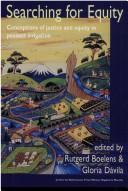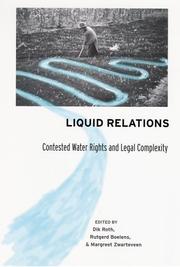| Listing 1 - 10 of 12 | << page >> |
Sort by
|
Book
ISBN: 9789463438810 Year: 2017 Publisher: Wageningen Wageningen University & Research
Abstract | Keywords | Export | Availability | Bookmark
 Loading...
Loading...Choose an application
- Reference Manager
- EndNote
- RefWorks (Direct export to RefWorks)
Book
ISBN: 9780415719186 0415719186 Year: 2015 Publisher: London Routledge
Abstract | Keywords | Export | Availability | Bookmark
 Loading...
Loading...Choose an application
- Reference Manager
- EndNote
- RefWorks (Direct export to RefWorks)
"This book addresses two of the major issues in current natural resource management policies. The first is the complex and conflicting relationship between local, on-the-ground natural resource management communities and national and international policy-making institutions and elites. The second issue is how to govern, manage and distribute water resources in contexts of growing water scarcity, natural resource degradation, shifting policies and identities, and intensifying local-global relationships. The book elaborates on the case of the Andean countries and their water control communities, policies, laws, and multi-scale relationships"--
Water rights --- Water-supply --- Water resources development --- Political aspects
Dissertation
ISBN: 9789085048961 Year: 2008 Publisher: Wageningen Universiteit Wageningen
Abstract | Keywords | Export | Availability | Bookmark
 Loading...
Loading...Choose an application
- Reference Manager
- EndNote
- RefWorks (Direct export to RefWorks)
Assimilation (Sociology) --- Collective farms --- Government, Resistance to --- Indians of South America --- Irrigation --- Water rights --- Water --- Political aspects --- Management --- Law and legislation

ISBN: 9023233859 9789023233855 Year: 1998 Publisher: Assen, the Netherlands: Van Gorcum,
Abstract | Keywords | Export | Availability | Bookmark
 Loading...
Loading...Choose an application
- Reference Manager
- EndNote
- RefWorks (Direct export to RefWorks)
Irrigation --- Irrigation farming --- Social aspects. --- Economic aspects. --- Social aspects --- Economic aspects --- Irrigated agriculture --- Irrigated farming --- Irrigation agriculture --- Agriculture --- Arid regions agriculture --- Crops and water --- Water in agriculture --- Chemigation --- Society and irrigation --- Irrigation - Social aspects --- Irrigation - Economic aspects --- Irrigation - Social aspects - Andes Region --- Irrigation - Economic aspects - Andes Region --- Irrigation farming - Andes Region
Book
ISBN: 3038978116 3038978108 Year: 2019 Publisher: MDPI - Multidisciplinary Digital Publishing Institute
Abstract | Keywords | Export | Availability | Bookmark
 Loading...
Loading...Choose an application
- Reference Manager
- EndNote
- RefWorks (Direct export to RefWorks)
Water acquisition, storage, allocation and distribution are intensely contested in our society, whether, for instance, such issues pertain to a conflict between upstream and downstream farmers located on a small stream or to a large dam located on the border of two nations. Water conflicts are mostly studied as disputes around access to water resources or the formulation of water laws and governance rules. However, explicitly or not, water conflicts nearly always also involve disputes among different philosophical views. The contributions to this edited volume have looked at the politics of contested knowledge as manifested in the conceptualisation, design, development, implementation and governance of large dams and mega-hydraulic infrastructure projects in various parts of the world. The special issue has explored the following core questions: Which philosophies and claims on mega-hydraulic projects are encountered, and how are they shaped, validated, negotiated and contested in concrete contexts? Whose knowledge counts and whose knowledge is downplayed in water development conflict situations, and how have different epistemic communities and cultural-political identities shaped practices of design, planning and construction of dams and mega-hydraulic projects? The contributions have also scrutinised how these epistemic communities interactively shape norms, rules, beliefs and values about water problems and solutions, including notions of justice, citizenship and progress that are subsequently to become embedded in material artefacts.
n/a --- politicized collective identity --- first nations --- socio-technical imaginaries --- dam --- political ecology --- STS --- irrigation --- contested knowledge --- negotiation --- Guatemala --- social construction of technology --- indigenous peoples --- multi-actor multi-scalar alliances --- vernacular statecraft --- compensation measures --- modernist traditions --- hydropower development --- agonistic unity --- Ecuador --- anti-dam resistance movements --- fantasy --- environmental governance --- collective action --- modernity --- depoliticization --- British Columbia --- hydraulic utopia --- A.O. Hirschman --- megadams --- India --- Canada --- hiding hand --- large dams --- Jacques Lacan --- commensuration --- DR Congo --- Málaga --- technological design --- Peru --- knowledge systems --- manufactured ignorance --- knowledge politics --- Himalayas --- San Lorenzo irrigation project --- politics of the governed --- North Sikkim --- uncertainty --- Bolivia --- hydrosocial territory --- psychoanalysis --- marginalization --- territorial control --- mega-dam --- hazard risk --- UnGovernance --- hydropolitics --- expectations --- power --- socioenvironmental impacts --- socio-economic impacts --- public knowledge controversies --- mega-hydraulic projects --- hydropower --- environmental impacts --- Site C --- knowledge encounters --- dam safety --- Dzumsa --- energy policy --- anti-dam movement --- hydroelectric megaprojects --- Spain --- hydraulic projects --- Chixoy irrigation project --- co-creation --- Mekong River Basin --- dehumanizing rationality --- hydroelectric development --- Inga --- territory --- knowledge arenas --- Málaga

ISBN: 128131658X 9786611316587 0813537843 9780813537849 9780813536743 081353674X 9780813536750 0813536758 9781281316585 Year: 2005 Publisher: New Brunswick, N.J. ; London : Rutgers University Press,
Abstract | Keywords | Export | Availability | Bookmark
 Loading...
Loading...Choose an application
- Reference Manager
- EndNote
- RefWorks (Direct export to RefWorks)
Water management plays an increasingly critical role in national and international policy agendas. Growing scarcity, overuse, and pollution, combined with burgeoning demand, have made socio-political and economic conflicts almost unavoidable. Proposals to address water shortages are usually based on two key assumptions: (1) water is a commodity that can be bought and sold and (2) "states," or other centralized entities, should control access to water.
Water rights. --- Rights, Water --- Water rights --- Water --- Riparian rights --- Water trusts --- Law and legislation --- Water-supply --- International cooperation --- Availability, Water --- Water availability --- Water resources --- Natural resources --- Public utilities --- Water resources development --- Water utilities
Book
ISBN: 1316836347 1316831841 1316832775 1107179084 9781316832776 9781316836347 9781316831847 Year: 2018 Publisher: Cambridge, England : Cambridge University Press,
Abstract | Keywords | Export | Availability | Bookmark
 Loading...
Loading...Choose an application
- Reference Manager
- EndNote
- RefWorks (Direct export to RefWorks)
Water justice is becoming an ever-more pressing issue in times of increasing water-based inequalities and discrimination. Megacities, mining, forestry, industry and agribusiness claim an increasingly large share of available surface and groundwater reserves. Water grabbing and pollution generate poverty and endanger ecosystems' sustainability. Beyond large, visible injustices, the book also unfolds the many 'hidden' water world injustices, subtly masked as 'rational', 'equitable' and 'democratic'. It features critical conceptual approaches, including analysis of environmental, social, cultural and legal issues surrounding the distribution and management of water. Illustrated with case studies of historic and contemporary water injustices and contestations around the world, the book lays new ground for challenging current water governance forms and unequal power structures. It also provides inspiration for building alternative water realities. With contributions from renowned scholars, this is an indispensable book for students, researchers and policymakers interested in water governance, environmental policy and law, and political geography.
Water supply --- Water rights --- Water security. --- Security, Water --- Human security --- Rights, Water --- Water --- Riparian rights --- Water trusts --- Availability, Water --- Water availability --- Water resources --- Natural resources --- Public utilities --- Water resources development --- Water utilities --- Social aspects. --- Law and legislation --- Water-supply
Book
ISBN: 9789942092649 9942092641 Year: 2015 Publisher: Quito Abya-Yala
Abstract | Keywords | Export | Availability | Bookmark
 Loading...
Loading...Choose an application
- Reference Manager
- EndNote
- RefWorks (Direct export to RefWorks)
Water-supply --- Ecology --- Political aspects
Book
ISBN: 9781844076765 9781849714556 9781849774796 9781136543517 9781136543555 9781136543562 Year: 2010 Publisher: Londres ; Sterling, Va. : Earthscan,
Abstract | Keywords | Export | Availability | Bookmark
 Loading...
Loading...Choose an application
- Reference Manager
- EndNote
- RefWorks (Direct export to RefWorks)
628.1 --- 628.176 --- 631.672 --- 628.176 Large-scale rural water consumption. Agricultural water consumption --- Large-scale rural water consumption. Agricultural water consumption --- 628.1 Water supply, treatment, consumption and use --- Water supply, treatment, consumption and use --- Water supply --- Social unrest --- Multiculturalism --- Politics and culture --- Water resources development --- Water rights --- Availability, Water --- Water availability --- Water resources --- Natural resources --- Public utilities --- Water utilities --- Rights, Water --- Water --- Riparian rights --- Water trusts --- Energy development --- Water-supply --- Culture --- Culture and politics --- Cultural diversity policy --- Cultural pluralism --- Cultural pluralism policy --- Ethnic diversity policy --- Social policy --- Anti-racism --- Ethnicity --- Cultural fusion --- Law and legislation --- Political aspects --- Government policy --- Water conservation --- Water use --- water supply --- Cultural values --- Politique --- Policies --- Andean region --- North America
Book
ISBN: 9786124121050 6124121050 Year: 2012 Publisher: Lima IEP Instituto de Estudios Peruanos [etc.]
Abstract | Keywords | Export | Availability | Bookmark
 Loading...
Loading...Choose an application
- Reference Manager
- EndNote
- RefWorks (Direct export to RefWorks)
| Listing 1 - 10 of 12 | << page >> |
Sort by
|

 Search
Search Feedback
Feedback About UniCat
About UniCat  Help
Help News
News